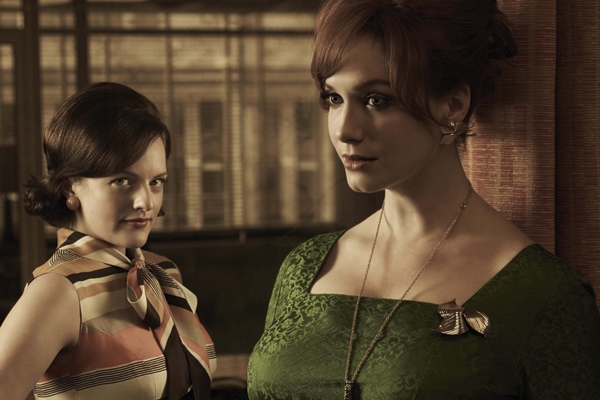I suspect that, when men and women watch Mad Men, they see very different things. Women probably see a witty indictment of male patriarchy. I, on the other hand, see Heaven on Earth. Everything shown on Mad Men is what male dinosaurs like me expect from western civilisation: liquid lunches, beautiful secretaries, exquisite suits and witty conversation. Alas, all of this is absent from the 21st-century workplace. Nowadays, downing half the contents of a bottle of Canadian Club whiskey in the middle of a business meeting can be a sackable offence.
Mad Men returned to our screens on Tuesday night (Sky Atlantic) with a two-hour special. For those who care about plot, it’s now 1966 and the Sterling, Cooper, Draper and Pryce ad agency is still in business. Don Draper has married his secretary, Megan, and is having difficulty coping with the big ‘four-o’. She throws a party for him and he is embarrassed by all the fuss. To lighten the mood, Megan performs a lap dance. Don is disgusted with her public sensuality and poor Megan has to win him back with some class-A super sex. No girl can keep up Megan’s level of vim for long, which is why that marriage isn’t going to last the season.
Meanwhile, Joan Harris is frustrated at how much her new baby is distracting her from work — a story nicely juxtaposed with that of Pete Campbell, who also has a new infant but who can farm it out to his wife at will. The firm is pushing hard for a contract with Heinz baked beans, but Peggy Olson’s idea of a ‘ballet of beans’ doesn’t go down well with the Heinz executives. Lane Pryce, a recent addition to the agency’s staff and painfully English to boot (which, inevitably, marks him out as a weirdo), finds a wallet with a picture of a woman inside it and decides to pursue her. Actually, that subplot seems strangely current in the age of Facebook.
The narrative is all good fun, but it’s not why people watch Mad Men. Most of us are drawn to it by the mise en scène — the smoky sets richly decorated in soft greens and ochre, the tight-fitting suits, the gravity-defying hair, the Joe 90 glasses and the incredible array of modernist right-angles. It’s at once foreign and instantly recognisable. In Britain, lots of people decorated their homes to look like that in the 1950s, and most of them never upgraded. Don Draper’s New York love pad looks eerily like my grandmother’s living room in Lewisham. But while my grandma’s house is a museum to plastic tat, Mad Men fills these sets with epoch-appropriate men and women who behave as squarely and as confidently as the architecture around them.
We also tune in to Mad Men because we want to see how its characters are going to cope with the cultural revolution of the 1960s. That’s why this particular series matters so much: it premiers at the cusp of a big change in American life. In the early 1960s, white men were still king of the world. By the end of the decade, they were the panicked vanguard of a dwindling ‘Silent Majority’, fighting a rearguard action against feminists, gays, civil-rights activists and hippies. Vietnam radicalised American culture and ended the postwar party for good. It won’t be long before the staff of Sterling, Cooper, Draper and Pryce is praying that Tricky Dick Nixon wins the 1968 election and restores some ‘sanity’ to American life.
At the beginning of the first episode, African–American protestors are shown picketing the street in support of equal-opportunity employment. The preppie bigots in the ad agency above drop water balloons on them. At the end of the episode, a large group of African–Americans turn up in response to a ‘help wanted’ ad. None of our heroes knows what to do with them. They can’t just send these folks away, as their fathers would have done in times past, so they grimly take their resumés.
The social impotence displayed in this scene is crucial to puncturing the macho nonsense upon which the entire series is based. The Mad Men might be emperors of their own tiny worlds, but the Sixties is about to invade that cosy domain and dethrone them. I anticipate having a lot of fun watching it happen.
James Delingpole is away.






Comments